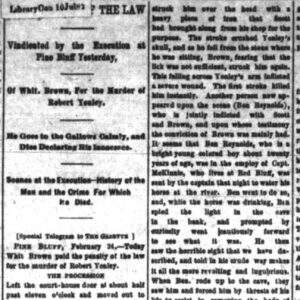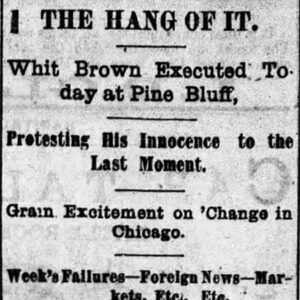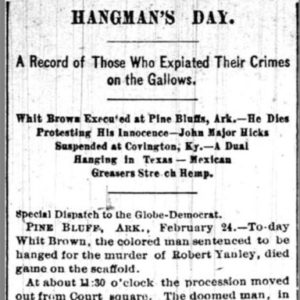calsfoundation@cals.org
Whit Brown (Execution of)
Whit Brown was an African American man hanged in Jefferson County on February 24, 1882, for a murder that he died denying having committed.
Robert Yonley, “a reputable saw mill man” who lived near Little Rock (Pulaski County), went to Red Bluff (Jefferson County) on August 8, 1881, to look after some timber interests he had in the area. His body was later found in the Arkansas River. Whit Brown, a local man who was born in Randolph, Tennessee, in about 1849, was summoned to serve in a coroner’s inquest jury, during which he “betrayed agitation and guilt and asked to be excused,” which was granted.
Little Rock detective Sid Boyce, who knew Brown as “a barber, gambler and robber,” arrested him at his home, and Brown blamed blacksmith Charles Scott and a young man named Ben Reynolds for Yonley’s murder. The three were taken to Redfield (Jefferson County), where magistrate Kirk Brodie ordered them jailed. All three were indicted on first-degree murder charges in December.
Reynolds turned state’s evidence and testified against Brown at his January 11, 1882, trial. Testimony showed that Yonley, who had been drinking, was enticed into a card game with Brown and Scott during which Brown allegedly struck him in the head with a “heavy iron shovel handle,” killing him. Reynolds happened upon the scene and was forced to help the others carry Yonley’s body to the nearby Arkansas River, where the body was weighted down with a rock and then cast into the water. Brown was described in newspapers as “a shrewd, sharp scoundrel, and used the other two murderers as his tool.” A Black man named Edwards also testified that Brown had confessed the murder to him. The jury of four Black and eight white men returned a first-degree murder conviction after ten minutes of deliberation. (Scott and Reynolds received a change of venue to Desha County; no information on the disposition of their cases is available.)
Brown was sentenced to hang on February 24, 1882. An appeal of his sentence was refused on February 21, and Governor James H. Berry refused a request to delay the execution for sixty days.
Brown was taken from the jail in Pine Bluff (Jefferson County) around 11:30 a.m. on February 24 and taken in a carriage guarded by ten men on foot and six on horseback to Brump’s Bayou, where the gallows had been erected. The procession was followed by “an immense rabble.”
Arriving around noon, Brown “with a firm tread, walked up on the platform of the gallows.” After a preacher said a prayer, the hymn “Show Pity, Lord” was sung. Brown proclaimed his innocence before rebuking Reynolds for his testimony, adding that he did not even know the witness Edwards who testified that Brown had confessed to him. He told the crowd that he “attributed all the misfortunes of his life to the unhallowed practice of playing cards, and enjoined all his color never to visit card houses and drinking establishments.”
The trap door opened about 1:15 p.m., “and Whit Brown’s body swung in the air, and his soul took its everlasting flight.” His body was taken down after hanging for eighteen minutes.
For additional information:
“Convicted.” Arkansas Gazette, January 12, 1882, p. 1.
“The Hang of It.” Arkansas Democrat, February 24, 1882, p. 1.
“Hangman’s Day.” St. Louis Globe-Democrat, February 25, 1882, p. 4.
“Indicted.” Arkansas Gazette, December 3, 1881, p. 1.
“The Majesty of the Law.” Arkansas Gazette, February 25, 1882, p. 1.
“Murder Will Out.” Arkansas Gazette, September 3, 1881, p. 1.
“Pine Bluff.” Arkansas Gazette, February 26, 1882, p. 4.
“Pine Bluff Gossip.” Arkansas Gazette, January 13, 1882, p. 2.
“Pine Bluff Gossip” Arkansas Gazette, February 24, 1882, p. 4.
“Sentenced.” Arkansas Gazette, January 17, 1882, p. 1.
“The Three Murderers.” Arkansas Gazette, September 3, 1881, p. 4.
“Whit Brown.” Arkansas Gazette, February 22, 1882, p. 4.
Mark K. Christ
Central Arkansas Library System
 Law
Law Post-Reconstruction through the Gilded Age, 1875 through 1900
Post-Reconstruction through the Gilded Age, 1875 through 1900 Whit Brown Execution Story
Whit Brown Execution Story  Whit Brown Execution Story
Whit Brown Execution Story  Whit Brown Execution Story
Whit Brown Execution Story 




Comments
No comments on this entry yet.